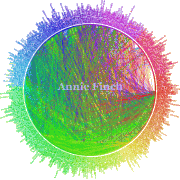I should be packing right now. I'm just about to get on an early plane to NYC with my daughter who, thanks to a great Jetblue deal, I am bringing to the Museum of Natural History and then the Dusie kollektiv reading and performance tonight at ACA Gallery. So, yes, I should be packing. But someone sent me a link to a Facebook events page for the reading---

.
So this morning I clicked on the link, went to the page, and clicked on "invite friends." it took me so long to scroll through everyone and locate some NY poets that I decided to play for a few moments and finally start a Friends list for poets.
Twenty minutes later, my list of poets is at 106 and I've barely started with the D's (just got through the Davids). As I click, each little colorful square and name takes me to a different place. These poets are all over the map in every sense. And weirdly, I feel a connection as I click on each name, even the ones I know only by name. Maybe it's the photos. Maybe it's the fact that they are in a little box labelled "Friends." Or maybe it's the way they juxtapose themselves so disarmingly, charmingly, blatantly, bizarrely, dauntingly, hauntingly, with the poets on either sides of them. It's as if each one feels to some extent like part of my community.
What does it mean that, for the first time in the history of poetry, a poet can maintain anything like awareness, let alone a sense of connection, to such a gigantic number of other poets? Not only do we have instant access to reading their work online; we can also develop some kind of social awareness of them, whether through meeting them at conferences and readings or simply through browsing facebook updates and youtube clips.
It's easy to think of all this potential knowledge as at best a handy tool, or a fun if frivolous toy-- and at worst, in grumpy moods, as a consumer of time and energy for no particular reason, or even to fear that the tradeoff in lack of depth and intensity of connection, compared to, say, how well Keats knew his small handful of poet-friends, is detrimental to useful interaction and poetic growth.
But I don't believe it. As I clicked on the names and faces of poets and thought about what I know of each one's work and life and aesthetic goals, prizewinners and students and even the deceased (hi Craig!), perfpos and langpos and newfos, all merrily juxtaposed by the great equalizer of the alphabet, I was moved. Humbled. Awed. This is something new in the life of poetry, and I'm excited to be part of it and to see where it may take us.
FOOTNOTE:
Back from New York, I see that someone has written about this post on a blog called Generation Bubble, which describes itself this way: "Generation Bubble surveys the psychic landscape of the “bubble generation,” a term we’ve coined to describe the progeny of the great age of deregulation. The ones the Culture Industry so breathlessly panders to. The ones who inform media content. The postliterate. The MySpacers. The FaceBookers. The freak-dancers. The body-obsessed. The overexercisers. The blasé wearers of overpriced slave-sewn garments. The pathologically other-directed. The aggressively lifestyle-oriented. The tunnel-visioned enablers of the status quo. The cohort of History’s end."
It's rather satisfying to have my post noted outside the poetry community (those who know me personally, with my herbal-infusion-brewing, bookish ways, would be taken aback to see me labelled, by implication, post-literate, let alone a body-obsessed overexerciser!--but hey, that part is kind of fun!). I'm also amused by the way the new context changes some of the resonances of my words. GB's response makes me realize that a good part of the exhilaration prompting this post came from a situation that those outside the poetry world might not grok: the fact that Facebook provides such a refreshing, relieving change from the marginalization that I and, I think, many poets feel in the culture at large. Unless we live in a huge city we are likely to be the only poet, or one of a tiny handful of poets, in our town or physical community--but at least online we can be part of a large, thriving, diverse group of people. I think GB's idea that my sense of the benefits of Facebook to poetry is "tantalizingly vague" is based on their ignorance of this context, and also their ignorance of another bit of historical background implied by my post: relief at a new spirit of curiosity and communication that seems to be moving through the poetry world in marked contrast to the fights and freezes that characterized the "poetry wars" of the last few decades. Addressing those I assumed would probably be, on balance, familiar with this history, my post was also implying that valuable multi-aesthetic discussions, influences, and alliances could well result from the new cross-poetics awareness that Facebook allows and even fosters.
That said, I really appreciate that GB is keeping an eye on the ways people are using new technologies with an eye to how deeper human fare in all this. So what do you think? Does GB have a point that Facebook represents poetry's facile lapping-up of numbing high-tech substitutes for real thinking and deep engagement with language? What do you Harrietteers think? What are the drawbacks and benefits of the "new poetry community" ?
Annie Finch is a poet, translator, cultural critic, and performance artist. She is the author of seven...
Read Full Biography

